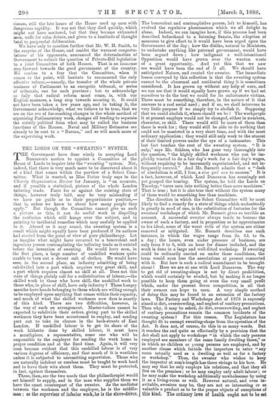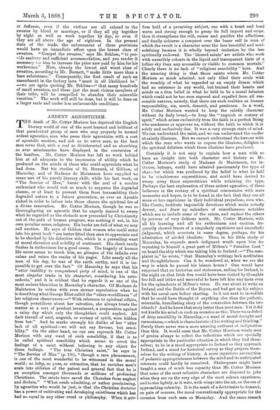THE LORDS ON THE " SWEATING " SYSTEM.
THE Government have done wisely in accepting Lord Dunraven's motion to appoint a Committee of the House of Lords to inquire into the " sweating " system. Not, indeed, that there is very much more to be discovered about it of a kind that comes within the purview of a Select Com- mittee. What is wanted, as Miss Potter truly says in the Charity Organisation Review for January, is " an accurate, and if possible a statistical, picture of the whole London tailoring trade. Facts for or against the existing state of things, however truly told, may be very misleading if we have no guide as to their proportionate position,— that is, unless we know to about how many people they apply." But though the Committee cannot give us such a picture as this, it can do useful work in dispelling the confusion which still hangs over the subject, and in pointing to incidental remedies which may usefully be applied to it. Absurd as it may sound, the sweating system is a result which might equally have been produced if its authors had started from the point of view of pure philanthropy. Let us imagine what might have occurred to a benevolent and ingenious person contemplating the tailoring trade as it existed before the invention of sweating. He would have seen, in the first place, a large number of unskilled workers quite unable to turn out a decent suit of clothes. He would have seen, in the second place, an industry admitting of being subdivided into a part which requires very great skill, and a part which requires almost no skill at all. Does not this state of things plainly call for a redistribution of labour,—the skilled work to those who have skill, the unskilled work to those who, in place of skill, have only industry ? These hungry mouths have hands belonging to them which are willing enough to be employed upon anything that comes within their capacity, and much of what the skilled workman now does is exactly of this kind. There are two difficulties, however, in the way of such an arrangement. Master-tailors cannot be expected to subdivide their orders, giving part to the skilled workmen they have been accustomed to employ, and sending part out to take its chance in the back-streets of East London. If unskilled labour is to get its share of the work hitherto done by skilled labour, it must have a mouthpiece, a representative, some one who will be responsible to the employer for sending the work home in proper condition and at the fixed time. Again, it will very soon become evident that this unskilled labour is of very various degrees of efficiency, and that much of it is worthless unless it is subjected to unremitting supervision. Those who are naturally indolent or careless must be taught to work hard and to have their wits about them. They must be protected, in fact, against themselves. These, then, are the two needs that the philanthropist would set himself to supply, and in the man who supplies them we have the exact counterpart of the sweater. As the mediator between the workmen and the employer, he is the middle- man ; as the supervisor of inferior work, he is the slave-driver.
The benevolent and contemplative person, left to himself, has evolved the repulsive phenomenon which we all delight to abuse. Indeed, we can imagine how, if this process had been described beforehand to a listening Senate, the adoption of measures to give effect to it would have been urged upon the Government of the day ; how the dislike, natural to Ministers, to undertake anything like paternal government, would have been argued down ; how indignant a well-intentioned Opposition would have grown over the wanton waste of a great opportunity. And yet this that we now see would have been the end of it all. We should have anticipated Nature, and created the sweater. The immediate lesson conveyed by this reflection is that the sweating system cannot be the abnormal and accidental thing it is sometimes considered. It has grown up without any help of ours, and we can see that it would equally have grown up if we had set ourselves to do the best we could for its unfortunate victims.
There must be something, therefore, in the nature of it that answers to a real social need ; and if so, we shall intervene to very little purpose if we simply try to abolish it. Supposing that we could abolish it, where should we be ? The workpeople it at present employs would not be changed, either in numbers, character, or skill. There would still be more of them than there is work for ; they would still be able to do nothing that could not be mastered in a very short time, and with the most ordinary application ; they would still only work to the utmost of their limited powers under the eye of a taskmaster. This last fact touches the root of the sweating system. " It is only," says Mr. Schloss, who has gone very thoroughly into the question, " the highly skilled workman who can be im- plicitly trusted to do a fair day's work for a fair day's wages, without requiring to be incessantly superintended, and not in- frequently coerced." And Mr. Burnett admits that a "dash of absolutism is still, I fear, a sine pet non to success." It is a fact, however, of which Lord Dunraven has seemingly not yet grasped the bearing. The system, he told the Lords on Tuesday, " turns men into nothing better than mere machines."
That is true; it is also true that without the system many of them woud be something less than machines.
The direction in which the Select Committee will be most likely to find a remedy for a state of things which undoubtedly is greatly in need of one, is the substitution of factories for the sweaters' workshops of which Mr. Burnett gives so terrible an account. A successful sweater always tends to become the owner of such a factory, and in proportion as he approximates to his ideal, some of the worst evils of the system are either removed or mitigated. Mr. Burnett describes one such instance, in which the wages range from 2s. 6d. to 8s.
a day ; the hours, even under pressure of business, are only from 8 to 8, with an hour for dinner included, and the work is done in a large and well-fitted workshop. If sweating could be ordinarily carried on under these conditions, the term would soon lose the associations at present connected with it. But how is such a radical amendment to be brought about ? Here we are at one with Lord Dunraven. The way to get rid of sweating-shops is not by direct prohibition, which would certainly be evaded, but by making it no longer possible to keep them going at even the very small profit which, under the present fierce competition, is all that their owners can hope to earn. A very simple method of doing this may be found in an extension of the factory laws. The Factory and Workshops Act of 1878 is expressly aimed at dirt, overcrowding, and neglect of sanitary precautions.
Then why, it may be asked, do dirt, overcrowding, and neglect of sanitary precautions remain the common incidents of the sweating system ? For this reason. The Legislature has thought fit to exempt sweating-shops from the operation of the Act. It does not, of course, do this in so many words. But it reaches the end quite as effectually by a provision that the Act shall not apply to workshops " in which the only persons employed are members of the same family dwelling there," or in which no children or young persons are employed, and by another clause which forbids the inspectors to enter " any room actually used as a dwelling as well as for a factory or workshop." Thus, the sweater who wishes to keep the inspector at arm's-length has three strings to his bow. He may say that he only employs his relations, and that they all live on the premises ; or he may employ only adult labour ; or he may make the workshop additionally unwholesome by using it as a living-room as well. However natural, and even in- evitable, sweaters may be, they are not so interesting or so valuable a product as to be the proper objects of exceptions of
this kind. The ordinary laws of health ought not to be set
at defiance, even if the victims are all related to the sweater by blood or marriage, or if they all pig together by night as well as work together by day, or even if they are all above the age of eighteen. In the present state of the trade, the enforcement of these provisions would have an immediate effect upon the lowest class of sweaters. " Compel the sweater," says Mr. Schloss, " to pro- vide sanitary and sufficient accommodation, and you render it necessary for him to increase the price now paid by him for his workrooms." Now, already the lowest and worst class of sweaters, according to Mr. Burnett, " make little more than a bare subsistence." Consequently, the first result of such an amendment in the factory laws " must in all likelihood be " —we are again quoting Mr. Schloss—" that many hundreds of small sweaters, and these just the most vicious members of their tribe, will be compelled to abandon their miserable vocation." The work will still be done, but it will be done on a larger scale and under less unfavourable conditions.



































 Previous page
Previous page